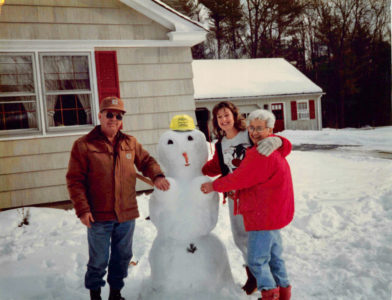Is Your Relationship Resilient?
Is Your Relationship Resilient?
Is Your Relationship Resilient?
My Grammy and Grampy are the very definition of a resilient relationship. At 94 and 95 years old, they recently celebrated their 70th wedding anniversary. When I called to congratulate them I asked Grammy for the secret to their resilience, and my four-foot-nine Grammy looked up to me and said, “Honey, in all that time, I never once thought about divorce. Now murder is a different story. I have definitely thought about murder.” You can see where I get my dark sense of humor.
 What makes great relationships withstand the test of time? Resilience. Life offers couples all sorts of challenges, not to mention those everyday bumps in the road and stressors that can take their toll on a relationship. Finances, kids, extended family, careers, and so many other things can place stress on a relationship.
What makes great relationships withstand the test of time? Resilience. Life offers couples all sorts of challenges, not to mention those everyday bumps in the road and stressors that can take their toll on a relationship. Finances, kids, extended family, careers, and so many other things can place stress on a relationship.
I’m grateful I had my first marriage (or as I like to call it, “my practice round”) because it taught me what was really important to look for in a partner. Jay and I have been together for twelve years, and while no relationship is perfect, I’m pretty damn proud of ours. Ninety-five percent of all marriages that involve a special needs child end in divorce. I’m beyond grateful that we have found a way to navigate those challenges together.
What makes a resilient relationship that stands the test of time?
With Valentine’s Day around the corner, we think of hearts, stuffed teddy bears, and lots of chocolate, but perhaps we should be thinking about fostering something much more valuable – Resilient Relationships.
Successful, resilient relationships can take many different forms, but there are five traits resilient couples share:
#1 – Practice Vulnerability
In her book Daring Greatly: How the Courage to Be Vulnerable Transforms the Way We Live, Love, Parent, and Lead, Dr. Brené Brown (@BreneBrown) defines vulnerability as “uncertainty, risk and emotional exposure.” Vulnerability, she says, “is the birthplace of love, belonging, joy, courage, empathy and creativity.” All of those are building blocks for becoming more resilient.

Early 1990s with Grammy & Grampy, and a snow-girl!
Vulnerability
In the past, the idea of vulnerability was usually associated with weakness. Being vulnerable means being susceptible to being hurt; showing vulnerability was the same as showing weakness. But in recent years, the word vulnerability has come to be used in a broader context — as in when you choose to share parts of yourself that you might be tempted to keep hidden. If you choose to show vulnerability with another person, that’s not a sign of weakness. It’s a conscious choice, and a sign of a healthy relationship.
Choosing to be vulnerable can be scary and uncomfortable, but building emotional resilience requires us to get comfortable with ambiguity and the unknown. It means that we risk being hurt but are still willing to forge ahead into the unknown because ahead is the only way to go. As an added bonus, showing vulnerability by sharing our feelings, asking for help, or taking responsibility for a mistake, can even make us more attractive to others.
#2 – Focus on Getting it Right
Is my goal to be right or get it right? The answer to this question, in large part, will determine the success of your relationships. It’s like the expression, “you may win the battle but lose the war”. You may technically be right, but that automatically makes the other person wrong, and that means you have entered a power struggle. The second you’ve entered a power struggle, you’ve already lost.
Our ego is a built in protection mechanisms, but if we aren’t careful, it can get in the way of healthy relationships. So the next time you are frustrated with your partner, and you wish they would act or be different, stop and determine what you might be able to change about your approach or mindset that could make the difference. Now as someone who teaches this concept, you would think I have it down right? Wrong! Here’s a great example I wrote that proves it! 🙂 (A Leadership Lesson from Toilet Paper) We often get so caught up in trying to be right, that we forget the actual goal of our communication.
Focus on getting it right (accomplishing the goal) rather than being right. At the end of the day, it doesn’t matter who was right, it is about getting it right and creating an environment for the relationship to flourish and sustain.
#3 – Willingness to Change First
Change is often awkward, messy, difficult, and uncomfortable. Think of the last major attitude or behavior shift you’ve made. It probably took a great deal of effort to get out of your comfort zone and learn new habits. If it is so incredibly difficult to change our own behavior, why do we think we change the behavior of others? The truth is, if there is an attitude or behavior you want to change in others, start by changing the way you think and behave. This is a tough one. You may ask, “Why do I have to be the one to change? They’re the ones with the problem!”
Because when it’s all said and done, you can only control your actions and behavior. Remember, whether it’s your job, your marriage, or your self-esteem, you can change anything by simply making the decision to do it. Habits are the choices we make deliberately that at some point become automatic.
I practice “Mind Over Moment” – paying attention in each moment to decisions you would otherwise make unwittingly. Mind Over Moment is about stopping to ask: “Is the way I am thinking and behaving going to get me the result I want?” If the answer is no, it means making a decision to change how we are thinking or behaving for a better result.
#4 – Apologize…Correctly
Effective communication is critical to the health of any resilient relationship, and “I am sorry you took offense to what I said”, is not an effective apology. It blames the other person and does nothing to take ownership and accountability. If you’ve ever tried to give an apology, chances are, you’ve used these two simple words, “I’m sorry”. If you’ve ever tried to accept an apology, I’m willing to bet that sometimes these two simple words just don’t cut it. Apologies often seem forced and insincere. When dissecting apologies, I always go back to Randy Pausch’s ‘Last Lecture’ interview with Oprah where he explains how to apologize correctly. A true apology, he explains, has three parts:
- I’m sorry
- I was wrong
- What can I do to make it right?
When you think about the apologies you’ve gotten and given, do they contain these three elements? Really make an effort to try to understand the other person’s viewpoint, rather than convince them of yours. It seems pretty simple, but I have found it is a powerful tool in helping build truly resilient relationships. Nothing withdraws resilience faster from a relationship than a lack of trust and integrity.
#5 – Resilience and the Power of Gratitude
I don’t know about you, but I’ve never gone home at the end of the day and complained that too many people appreciated me. Words are powerful. Words can strengthen or destroy relationships, they can win or lose business deals, they can bring families together or tear them apart, and they can trigger emotions ranging from euphoria to despair. Since gratitude is the number one predictor of well-being, be purposeful about saying ‘Thank you’ and taking the time to feel grateful for all of the little things your partner gets right, rather than the reasons he/she annoys you. It’s hard to resent someone when you are appreciating them.
We all want to feel appreciated and valued, and when someone takes the time to sincerely say “thank you”, it does just that. In resilient relationships, partners appreciate each others’ efforts, and they give each other the benefit of the doubt.
True love is not a fairy-tale, and even the healthiest relationships have ups and downs!
By the very definition, a resilient relationship is one that has overcome and learned from obstacles, adversity, and setbacks and emerged stronger as a result. Flowers and chocolates are great (diamonds are even better), but truly resilient relationships are celebrated with love, patience, and gratitude.
Xoxo,
Anne
Have thoughts or feedback? We want to hear from you! Drop some ❤️ in the comments.

Anne Grady is a Speaker, Author, and #TruthBomb Dropper.
Anne shares practical strategies that can be applied both personally and professionally to improve relationships, navigate change, and triumph over adversity. And she’ll make you laugh while she does it. Anne is a two time TEDx speaker, and her work has been featured in numerous media outlets, including Harvard Business Review, Entrepreneur, Forbes, Fast Company and Inc. magazines, CNN, ESPN, and FOX Business. She is the best selling author of 52 Strategies for Life, Love & Work and Strong Enough: Choosing Courage, Resilience and Triumph.







Thanks for share this article it is quite helpful to me.
Best regards,
Harrell Cannon
I’m so glad! Thanks, Harrell.